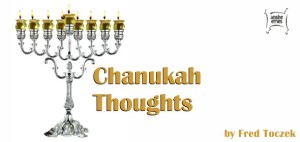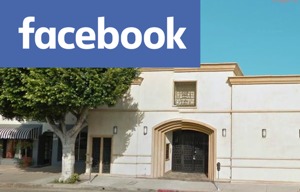 Chanukah: SELECTED THOUGHTS
Chanukah: SELECTED THOUGHTS
by Fred Toczek
HISTORICAL OVERVIEW
In 165 B.C.E., the Syrian emperor Antiochus waged a bloody war against the Jews. The Holy Temple was invaded, desecrated and robbed of all of its treasures and many innocent people were massacred. Idols were placed on the Holy Altar, before which Jews were forced to bow down under penalty of death. Antiochus also outlawed the observance of several of Judaism’s most sacred traditions, including: the Sabbath (which witnesses that G-d created the world in six days), Rosh Chodesh (which symbolizes our obligation to instill holiness into time, and makes possible the time-related festivals); and Circumcision (which demonstrates that the physical and spiritual must be intertwined).
In the small village called Modin (just east of Jerusalem), Mattityahu (patriarch of the priestly Hasmonean clan) challenged Antiochus’ troops and those who acquiesced to their demands. With his five sons, they attacked the troops, slew the idolaters and destroyed the idols. With the cry of “All who are with G-d, follow me!,” he and the others retreated to the hills, where they gathered forces. Mattityahu’s army, now under the command of his son Yehudah Maccabee, grew. With the Biblical slogan “Who is like unto Thee, Oh G-d” emblazoned on their shield, and only 6,000 strong, they defeated a heavily armed battalion of 47,000 Syrians (as well as an even larger army subsequently sent by Antiochus). They proceeded to Jerusalem, liberated it and reclaimed the Temple. Upon rededicating the Temple, they found only one small cruse (sufficient to last only one day) of the pure sacred olive oil necessary to kindle the Menorah lights (it would take eight days to prepare new ritually permitted oil). Undaunted, they lit the Menorah with this small amount of oil and dedicated the Temple anew. Miraculously, the flames of the Menorah shone brightly for eight full days. The following year, our Sages proclaimed the festival of Chanukah as a celebration beginning on the 25th day of Kislev and lasting eight days, in perpetual commemoration of this victory over physical and religious prosecution. (Sources: Chabad Chanukah Guide; Jewish Literary; Chanukah: Gifts For The Soul; Artscroll Chanukah Guide)
BIBLICAL REFERENCES TO CHANUKAH
There are a number of allusions to Chanukah in the Torah: (a) Chanukah occurs on the 25th of Kislev; the 25th word in the Torah is “Ohr” (“light”); (b) the 25th stop on the Israelite’s 40-year journey in the wilderness was Chashmonah, a name reminiscent of Chashmonaim (Hasmoneans); and (c) in the portion of Emor, after the Festivals of the entire year are enumerated in detail, we find the command “to bring clear illuminating oil from hand-crushed olives to keep the lamp burning constantly”; the juxtaposition of these two passages – that of the Festivals and that of the Eternal Light – presages the emergence of a future holiday that would celebrate the kindling of the oil. (Source: Essence of the Holy Days, citing Pesikta Ze’irta)
RITUAL OBSERVANCES/CUSTOMS
The Menorah. The Menorah is lit after nightfall. On the first night, one candle is lit and one additional candle is lit for each subsequent night (i.e., so that a total of eight candles are lit on the eighth day). The candles are placed in a Menorah, a candelabra with eight level openings and a ninth opening (the Shamash) which is used to light the other candles. The Menorah is placed near a window so that passersby can see it from the street, in fulfillment of the dictum “to publicize the miracle.” (In the days of the Mishnah, the Menorah was lit in the doorway opposite the Mezuzah, so that upon entering or leaving the house, one was surrounded by mitzvot.) In fact, publicizing the miracle is the sole function of the Chanukah candles; they must not be used for any purpose (e.g., to read, etc.). While the candles are burning, it is customary for women to refrain from work. (Sources: Jewish Literacy; To Be A Jew; Jewish Learning Exchange Chanukah Outline)
Special Prayers. During Chanukah we recite the “Al Hanisim” (“For The Miracles”) in our daily prayers, as well as in the Grace After Meals. In the morning service, we add the complete “Hallel” (special prayers of praise from the Psalms of David). In addition, special readings from the Torah are read each morning in Synagogue. (Source: Chabad Chanukah Guide)
The Dreidel. The dreidel is much more than a spinning top. When the Syrians outlawed the teaching or studying of Torah, the children defiantly studied in secret. When the Syrian patrols were spotted, they pretended to be playing an innocent game of dreidel. The Hebrew letters printed on each side (Nun, Gimmel, Hay and Shin) form the acronym “Nes Gadol Haya Sham” (“a great miracle happened there [in Israel]).” The four letters of the Dreidel also represent four different historical empires (Babylonian, Persian, Greek and Roman) that tried to destroy the Jewish people. The dreidel thus reminds us of our eternal defiance of anyone who tries to step between the Torah and us. (Sources: Chabad Chanukah Guide; Jewish Literacy; Chanukah: Gifts For The Soul)
Latkes. Among American Jews, the latke is the traditional Chanukah food. (In Israel, the most popular Chanukah delicacy is the sufganiyot, a fried jelly roll). The latke (or sufganiyot) recalls the miracle respecting the oil. (Source: Jewish Literacy)
Gelt. It is traditional to give children coins (gelt). The gelt adds to the festive spirit. The gelt also reminds us that the struggle of Chanukah was a struggle to preserve the Torah. Specifically, many teachers and students were imprisoned or tortured for studying Torah or forced into hiding to continue their studies clandestinely. Thus, Jewish leaders focused on the financial need of Jewish educational institutions during the time of Chanukah. Parents would give a gift of money to their children as a reward for their involvement in Torah study. This was not meant as payment for their studies, but rather as a tangible display of the parents’ appreciation of their children’s dedication. (Source: Chanukah: Gift For The Souls)
Other Customs. In addition, it is customary to have special meals in honor of Chanukah, increase the giving of charity to the poor, refrain from fasting and eulogies and strengthen our Torah study. (Source: Jewish Learning Exchange Outline)
CHANUKAH’S DEEPER MEANING – 14 LIFE LESSONS
The Supremacy of Spirituality. Antiochus attempted to strip Judaism of its holiness. It was acceptable to the Hellenists for Jews to identify as Jews provided that they were willing to forsake the underlying G-dliness of Torah. This idea has particular significance to us today, when (thank G-d) the majority of world Jewry lives in relative material comfort. Our blessings and freedom, however, also make it easy for us to overlook the true source of our strength as a people. The Chanukah lights, of which we are not permitted to make any use, affirm the supremacy of spiritual light over materialism. By lighting the Chanukah lights, we recognize that the world in which we live is not an end of itself, but exists to serve a higher spiritual purpose. (Source: Lubavitcher Rebbe, z’tl).
Illuminating the Darkness. A great Rabbi once remarked that “you cannot chase away darkness with a stick – you have to turn on the light.” The way to eliminate darkness – to rid the world of ignorance, negativity, hatred and greed – is to kindle the lights of knowledge, generosity, hope and love. The Menorah is lit only after nightfall, signifying that our purpose is to illuminate the darkness of the world. (Source: Lubavitcher Rebbe, z’tl).
Spreading the Light. The Menorah is lit so that it can be seen outside in the street. It is not enough to bring light into our own private domain; rather we must spread the light and warmth of Torah to the our environment as well. (Source: Lubavitcher Rebbe, z’tl)
Brighter and Brighter. Each night, we add another light to the Menorah until eight lamps shine on the eighth night. This signifies that in the matters of holiness, we must always be on the increase. We must go from strength to strength in deepening our commitment to Judaism’s values and traditions. (Source: Lubavitcher Rebbe, z’tl)
Modern Miracles. The Chanukah lights are more than simply a daily reminder of an ancient miracle – they are a potent reminder of the miracles which surround us daily. In the second blessing recited over the candles, we state “…Blessed are You…who wrought miracles for our ancestors – in those days, at this time.” By reflecting on the words “at this time,” we see with ever-increasing clarity the miraculous dimension of events in our own lives. (Source: Lubavitcher Rebbe, z’tl)
Redemption Against All Odds. Throughout the ages, Chanukah has signified the miraculous triumph of the weak over the strong, the pure over the impure, the righteous over the wicked. No matter how dark the night, the Chanukah lights proclaim with confidence that the dawn of deliverance is near. (Source: Lubavitcher Rebbe, z’tl)
The Significance of “Eight”. Chazal explain that there is great significance in the fact that the Menorah has eight lamps, and that we celebrate the Festival for eight days. The number eight represents a level that is higher than nature, and above time. This is the level of the miraculous, which is not bound by the law of nature. (Source: Lubavitcher Rebbe, z’tl)
The Freedom To Observe Torah. While the other Festivals are celebrated with tangible symbols (e.g., matzos, sukkah, shofar, lulav/esrog), Chanukah is marked only with a spiritual symbol of light. The light represents the freedom to observe Torah (“for the mitzvah is a lamp, the Torah is a light”), which was the victory of Chanukah. (Source: Rabbi Shneur Zalman of Liadi, z’tl)
A Family Festival. The Talmud (Shabbat 21(b)) dictates that “each member of the family is obligated to kindle Chanukah lights”. Lighting the Menorah in synagogue is not enough. What good is it to praise G-d in the synagogue if the spirit of Torah is absent from the home? Chanukah calls upon us to ask ourselves these questions: Does the Torah light the way for our children and us? Does the glow of Judaism warm our hearts and homes? (Source: Rabbi Samson Raphael Hirsch, z’tl)
Lighting Our Own Inner Flame. The Menorah and its flames represent the light of Torah wisdom — the soul of the Jewish nation. Every day the Menorah was rekindled as a reminder that each and every Jew needs to take daily steps towards lighting his or her own inner flame by exploring the Torah’s wisdom. (Source: Chanukah: Gifts For The Soul).
Educating Our Children. Chanukah reminds us of our obligation to educate our children. The word “Chanukah” means “education, ” “dedication” and “beginning”. The reference to education reminds us that education is a responsibility incumbent upon every father and mother. Chanukah reminds us that Jewish parents are called upon not only to teach their children life-enhancing skills, but also to teach those values and ideals that will bring meaning to their children’s lives. (Source: Chanukah: Gifts For the Soul)
Each of us is a vessel. The image of the cruse of oil reminds us that, in some way, we are all receptacles. Each of us has a potential to receive spirituality into our lives. In our hands we hold the moist clay of our own lives. We possess a far-reaching ability to shape the vessel we long to be. Chanukah is a time when there exists unusual potential to re-shape our vessels and thus enable ourselves to receive all sorts of spiritual gifts that we never imagined possible. As the Sfas Emes, z’tl wrote, “during Chanukah the same spiritual lights that were created by the miracle are once again available to every Jewish soul. However, in order experience and share this unique light, we need to detach ourselves from the natural order of things, and thereby ready ourselves to receive that which emanates from above the natural order.” (Source: Chanukah: Gifts of the Soul)
The Dedication and Heroism of Jewish Women. The Torah contains many examples of the unique and essential role played by Jewish women throughout history. These include role models such as Sarah, Rebeccah, Rachel and Leah; G-d instructing Moshe to present the Torah first to the women; King Solomon’s instruction that a child’s most fundamental connection to the Torah – to Judaism – is instilled by the special communicative abilities of his/her mother. In the story of Chanukah, we read of the bravery of Yehudis, the great lengths to which Jewish women went to ensure that their baby boys were circumcised, and of the heroism of Hannah and her sons. Chanukah is a particularly apt time to focus on the spiritual sensitivity and commitment of women that has been so instrumental in Jewish survival and continues to be the key to a surviving Jewish nation. (Source: Chanukah: Gifts From the Soul).
Never Give Up. Chanukah tells us to never give up, no matter how formidable the challenge. When the Hasmonian family realized that they had no choice other than to confront the Greeks and attempt the impossible, they linked up with a force beyond themselves and achieved the impossible. They reached for what beyond their grasp and were thus privileged to initiate events that transcended nature: the victory over the Greeks and the flask of oil which burned for eight days. (Source: Rabbi Eliyahu Dessler).
HAPPY CHANUKAH!



 Visit the group and request to join.
Visit the group and request to join.
